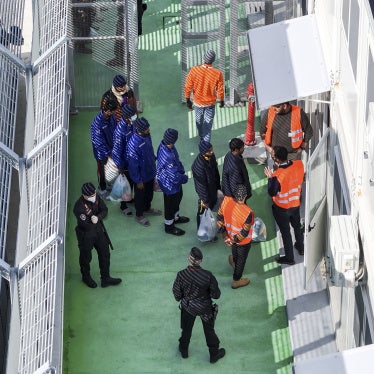Human Rights Watch today criticized the decision of the Montenegrin government to deny those fleeing the fighting in Kosovo entry into Montenegro.
While we acknowledge the burdens faced by the Montenegrin government in responding to this crisis, closing the border effectively traps people who are fleeing continued fighting and wide spread atrocities by Yugoslav government forces," said Holly Cartner, Executive Director of the Europe and Central Asia division of Human Rights Watch.
On September 11, 1998, in a late evening session the Montenegrin government decided to close the internal boundary between Montenegro and Kosovo to all persons seeking refuge from the armed conflict. The government justified its decision based on the economic strain posed by the incoming displaced persons and its fear that new arrivals would increase ethnic tensions and possibly destabilize the country.
At the time of the decision, approximately 40,000 ethnic Albanians from Kosovo had taken refuge in Montenegro. Combined with an additional 30,000 refugees who had fled the war in Bosnia and Croatia, refugees and displaced persons in Montenegro comprise 11.6 percent of the total Montenegrin population, according to the government. As a result of the swelling refugee population in Montenegro, xenophobia and ethnic tension are on the rise.
On September 13, a group of 3,200 ethnic Albanians from Kosovo were expelled to Albania by the Montenegrin authorities. Two-thirds of those expelled were women, children, and the elderly, according to humanitarian sources. They arrived in Montenegro on September 11, and were kept on the outskirts of the town of Plav until their expulsion on September 13. The government of Montenegro has pledged to provide safe harbor to the refugees and internally displaced persons who arrived on its territory prior to the September 11 decision.
Since March 1998, the Yugoslav government offensive in Kosovo, accompanied by systematic atrocities and human rights violations, has forced at least 300,000 people to flee their homes. Many are currently in exposed conditions inside Kosovo facing ongoing attacks. An estimated 80,000 people have fled Kosovo for neighboring republic of Montenegro, and the neighboring countries of Albania and Macedonia. Human Rights Watch is concerned that these territories, if forced to rely only on their own resources, will not have adequate means to receive refugees and displaced persons in conditions that ensure their health and well-being.
Despite many promises, western governments have not provided sufficient aid to Montenegro in responding to its refugee crisis. "To date, the international community has not mustered the resolve to force an end to the fighting in Kosovo, fighting that on a daily basis produces new waves of displacement and suffering. Civilians are by far the primary victims of this conflict." said Ms. Cartner. "As winter approaches, the failure to fund relief efforts will only further contribute to the humanitarian disaster."








